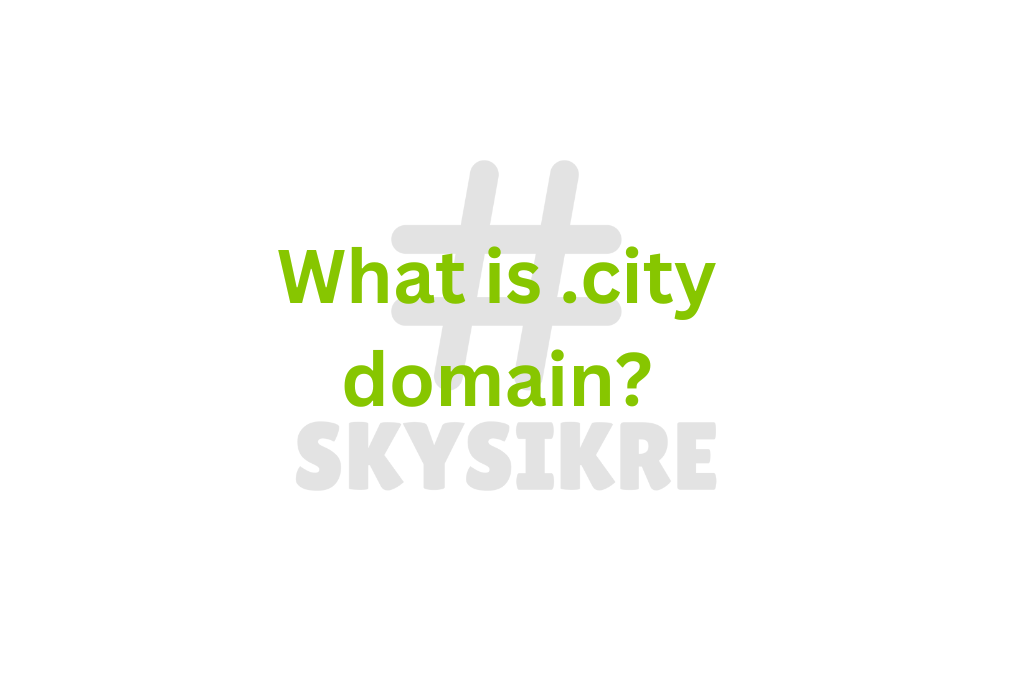Introduction to .city Domain
The .city domain is a specialized top-level domain (TLD) that caters specifically to urban areas and local communities. Introduced to enhance online presence, it serves as an identifier for cities, municipalities, and local organizations. The primary aim of the .city domain is to provide a dedicated platform for entities wishing to establish a digital identity closely associated with geographical locations. By adopting a .city domain, stakeholders can create a strong, recognizable online brand that resonates with their local audience.
This domain extension is particularly significant for cities seeking to foster community engagement and enhance tourism. Local governments and municipalities can utilize a .city domain to offer residents and visitors straightforward access to information about services, events, infrastructure, and cultural initiatives. By centralizing information on a recognizable TLD, towns and cities can improve information dissemination and promote civic pride.
History and Origin of the .city Domain
The .city domain was introduced as part of a broader initiative by the Internet Corporation for Assigned Names and Numbers (ICANN) to expand the generic top-level domain (gTLD) space, enhancing the web’s convenience and functionality. The launch of this specific domain occurred in 2014, with an objective to provide municipalities and local entities a dedicated platform to enhance their online presence. The .city domain was conceptualized to enable cities to showcase their uniqueness and initiatives while providing a digital identity that resonates with their geographic identity.
Governed by a registry, the .city domain is designed to serve municipalities and communities seeking a distinctive web presence. This move towards specialty domains was influenced by the increasing demand for more descriptive and relevant web addresses that summarize entities more effectively than traditional domain extensions. By introducing the .city domain, ICANN aimed to empower local governments, organizations, and businesses to identify themselves more closely with their locales on the global internet stage.
Within the larger context of gTLDs, the .city domain contributes to a diverse array of options that cater to specific themes, industries, or geographical locations. The rationale behind the establishment of such targeted domains is grounded in the belief that they facilitate better user experiences and connections by aligning web addresses with the entities they represent. As cities continue to evolve digitally, the .city domain stands as a testament to the growing influence of local online identities, encouraging civic pride and engagement through established digital channels.
Purpose and Benefits of the .city Domain
The .city domain serves a unique purpose, specifically designed for cities and local communities. Its primary aim is to enhance online presence and establish a distinct identity for urban areas on the internet. By utilizing a .city domain, municipalities and local businesses can create dedicated online spaces that reflect their local culture, attractions, and services. This specificity helps residents and visitors alike easily identify and engage with local offerings, establishing a stronger community connection.
One of the significant benefits of adopting a .city domain is the improvement of local identity. A .city domain provides a platform for cities to showcase their unique attributes, such as historic landmarks, cultural events, and community services. This targeted branding can foster pride among residents, encouraging both tourist visits and local support for businesses. Furthermore, local businesses leveraging a .city domain can better position themselves within the community, allowing for enhanced visibility and growth opportunities.
Another prominent advantage of the .city domain is the potential for increased community engagement. By creating a presence on a .city domain, local governments and organizations can effectively communicate with residents. This can include sharing important news, updates, events, and resources tailored to community interests. Furthermore, the interactive nature of digital platforms enables community members to contribute their ideas and feedback, fostering a sense of belonging and cooperation among residents.
Lastly, the .city domain can lead to improved search engine optimization (SEO) for local businesses. A domain that directly aligns with a specific geographical location enhances visibility in online searches. This can drive more targeted traffic to local websites, ultimately benefiting local enterprises as they compete in an increasingly digital marketplace. Overall, the .city domain offers multiple avenues for cities and local businesses to thrive in the modern economy, fostering long-term growth and community development.
Who Can Register a .city Domain?
The .city domain is designed to cater to a diverse range of users who have a connection to a specific geographic location. This makes it suitable not only for municipalities and local governments but also for businesses, organizations, and individuals seeking to promote their ties to a particular city. In essence, the eligibility criteria for registering a .city domain are relatively broad, appealing to those who want to establish a digital presence linked to their locale.
Local governments and municipal authorities are the primary registrants of the .city domain. It allows them to create official websites that convey information about services, events, and public resources available in their respective cities. Furthermore, urban planners and city development agencies can leverage the .city domain to provide insights on development projects, community initiatives, and urban culture.
Small businesses and local entrepreneurs can also benefit significantly from securing a .city domain. By registering a domain that incorporates their city name, businesses can enhance their local branding, making it easier for potential customers to find them online. This localized approach can help businesses stand out in an increasingly crowded digital marketplace.
Moreover, community organizations and non-profits often utilize .city domains to showcase their programs and foster engagement within their communities. By adopting a .city domain, these entities can highlight their contributions to urban life and stimulate civic participation.
Despite the general accessibility of .city domains, it is important to note that some registrars may impose registration restrictions, primarily to ensure that the domains serve their intended purpose. Potential registrants should always review specific requirements and restrictions outlined by the domain registrar they choose. Ultimately, the .city domain offers valuable opportunities for a variety of users to establish their place in the online space, linked to their urban environment.
How to Register a .city Domain
Registering a .city domain is a straightforward process designed to make your online presence accessible and recognizable. The first step is to choose a domain name that is relevant to your city, community, or the services you provide. This is important because an effective domain name should be descriptive, easy to remember, and reflective of your brand. To aid in this process, consider utilizing a domain name generator for inspiration while ensuring the name is unique and marketable.
Once you have selected a suitable name, the next step is to check its availability. This can be done through various domain registration platforms or registrars. Popular domain registrars such as GoDaddy, Namecheap, and Google Domains offer comprehensive search features that allow you to determine if your desired .city domain is available for registration. If your selected name is taken, many registrars will provide alternative suggestions to help you find a suitable choice.
After confirming the availability, you will need to complete the registration process. This involves creating an account with your chosen registrar and filling out the necessary information, which typically includes your name, contact details, and payment information. Pricing for .city domains can vary widely among registrars and may change based on promotions or additional services offered, such as privacy protection or email hosting. It is advisable to compare prices and features before making a final decision.
Finally, once your payment is processed and registration is complete, you will receive confirmation of your ownership. Remember to renew your .city domain before its expiration to maintain your online presence. Following these steps will ensure a seamless registration experience and help you establish your brand effectively online.
SEO Considerations for .city Domains
When considering a domain name for your local business, choosing a .city domain can have significant implications for search engine optimization (SEO). One of the primary advantages of a .city domain is its inherent keyword relevance. Since the extension itself denotes a geographic area, it can effectively communicate the locality of your business to both users and search engines. This signaling can potentially enhance your website’s visibility in local search results, making it easier for audience members searching for specific services within a particular city to find you.
Moreover, local SEO is a crucial aspect of online marketing for businesses that aim to attract clients from their immediate surroundings. A .city domain specifically targets regional audiences and fosters a sense of community. By incorporating the name of the city in the domain, businesses clearly indicate their geographic focus, which can contribute to improved rankings in location-based search queries. This is particularly beneficial for small and medium enterprises, as Google tends to prioritize local content when serving search results.
In addition to keyword relevance and local SEO benefits, a .city domain can also enhance online visibility for local businesses by helping to establish credibility and trust within the community. Consumers are often more inclined to engage with businesses that exhibit a strong local presence. A .city domain projects an image of local commitment and expertise, thereby attracting customers who value proximity and familiarity.
Utilizing a .city domain can also lead to improved click-through rates on search engine result pages (SERPs). When users see a domain that directly corresponds with their location, they may be more likely to click on it. This not only drives traffic to the website, but it can also enhance the overall user experience, leading to lower bounce rates and higher engagement levels.
In conclusion, using a .city domain can significantly influence your local search engine optimization strategy, aiding your quest to connect with a community-oriented audience while enhancing your online presence.
Successful .city Domain Examples
The use of .city domains has become increasingly popular among municipalities, local businesses, and organizations seeking to establish a digital presence that reflects their unique urban identity. Numerous cities around the globe have adopted .city domains to enhance their online visibility and engage with their communities effectively. One prominent example is sandiego.city, which provides comprehensive information about local events, attractions, and services, enabling residents and visitors alike to explore the city’s offerings seamlessly.
Another illustrative case is nashville.city, which showcases local music events and cultural festivals. Using the .city domain has allowed Nashville to reinforce its branding as the “Music City” while simultaneously promoting local artists and venues. The intuitive nature of the domain has made it easier for users to remember and access the site, contributing to its steady traffic and engagement metrics.
Small businesses within these urban environments have also leveraged .city domains to bolster their reach. For instance, portland.city serves as a hub for local businesses, featuring a directory of shops and services, promotions, and neighborhood events. This strategic use of the .city domain allows Portland to foster a sense of local community while encouraging residents to support neighborhood enterprises.
Furthermore, organizations focused on tourism have also benefitted from adopting .city domains. A notable example includes boston.city, which acts as an informational portal for tourists, offering insights into historical attractions, dining options, and guided tours. By utilizing a .city domain, Boston has effectively consolidated its resources into a single platform that enhances the visitor experience and promotes sustainable tourism.
Future Trends for .city Domains
The .city domain is witnessing a transformative phase as urban areas continue to grow and digitalize. The trend towards online branding is expected to amplify, resulting in increased adoption of .city domains by municipalities, businesses, and local organizations. As cities recognize the importance of establishing a unique digital identity, the .city domain presents an optimal solution for showcasing their services, events, and amenities while promoting local culture and heritage.
Technological advancements will play a significant role in shaping the future of .city domains. The rise of smart city initiatives will likely accelerate the use of these domains as cities integrate IoT technologies and big data analytics to enhance urban management. For instance, .city domains may evolve into centralized platforms for citizens to access real-time information regarding public transportation, waste management, and local government services. This shift aims not only to foster community engagement but also to streamline communication between residents and city officials.
Market demand for .city domains is also expected to increase as cities compete to attract tourists and businesses. This competition may lead to the development of niche .city domains that focus on specific themes or features of a city, such as nightlife, arts, or technology. These specialized domains will allow local businesses to capitalize on their unique characteristics, fostering a sense of community and encouraging residents and visitors alike to explore urban offerings.
In light of the growing emphasis on online presence, cities may also leverage .city domains for marketing campaigns and public relations efforts. Empowering citizens with a platform to voice their thoughts on city improvement through dedicated .city websites could promote inclusivity and encourage community involvement. Ultimately, as the digital landscape continues to evolve, the .city domain is poised to become a vital component of a city’s identity, enhancing its reputation and driving economic development.
Conclusion: The Importance of .city Domains
In today’s digital landscape, the significance of a suitable domain name cannot be overstated. The .city domain emerges as a compelling choice for cities and local organizations seeking to establish a strong online presence. By leveraging this specific domain extension, municipalities can enhance their brand visibility and connect more effectively with their constituents.
The adoption of a .city domain offers several advantages that can benefit local governments and organizations. First and foremost, it signals to users that the website is specifically tailored for a particular city, making it easier for residents and visitors to find relevant information. Additionally, a .city domain helps create a sense of local identity and pride, fostering community engagement through an enhanced online representation of the city’s culture, services, and initiatives.
Moreover, utilizing a .city domain can improve search engine optimization (SEO) for local searches. When users search for services or information pertinent to a specific area, having a .city domain can increase the likelihood of appearing in relevant search results. This visibility is crucial for local businesses and organizations that rely on attracting nearby clients or constituents.
Beyond practical advantages, transitioning to a .city domain may also be a strategic move that positions local entities as forward-thinking and tech-savvy. As digital interactions continue to grow, adopting a .city domain can be an integral part of a comprehensive digital strategy for cities and organizations keen on maintaining relevance in the ever-evolving online environment.
In conclusion, implementing a .city domain offers significant benefits for cities and local organizations looking to strengthen their online presence. The domain extension not only enhances local relevance but also fosters a stronger connection between city initiatives and community engagement. Embracing the .city domain could be a decisive step towards a more connected, informed, and engaged citizenry.






